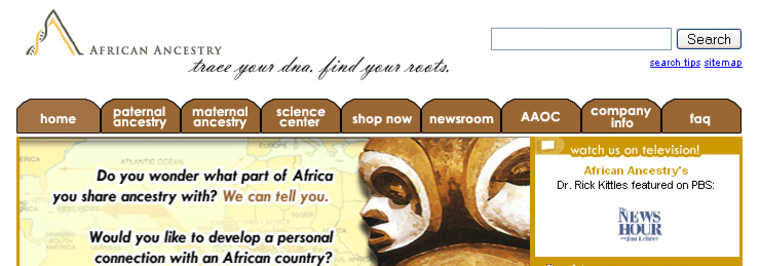African-Americans hoping to use DNA to find their roots may have to look harder than previously thought, researchers said on Thursday in a study they said shows Africans are too genetically mixed to make tracing easy.
Several companies now offer to help Americans trace their African ancestry using mitochondrial DNA, which is passed from mother to daughter virtually unaltered.
"What's your tribe?" asks one. "Trace Your Roots Back in Time," offers another.
But biologist Bert Ely of the University of South Carolina and colleagues found that fewer than 10 percent of African-American mitochondrial DNA sequences that were analyzed can be matched to any single African ethnic group.
The news might disappoint people who cannot trace a long paper trail of ancestors. More than 11 million Africans were forcibly shipped to the Americas during the slave trade that peaked in the 17th and 18th centuries.
"The test that everybody does is the same test and it is all valid," Ely said in a telephone interview.
"It is just that some companies will over-interpret the data and give you the most likely result instead of all of the matches."
Working with colleagues at the University of Massachusetts and the University of Maryland, Ely looked at 3,700 mitochondrial DNA sequences from people in sub-Saharan Africa.
More genetic diversity among Africans
They also sampled African-Americans, including people who identify themselves as "Gullah" or "Geechee" and live along the coasts of South Carolina and Georgia. These groups have close cultural ties to Sierra Leone, including language, stories and crafts.
Because there is more genetic diversity among Africans than among people from any other continent and because humanity has been in Africa longer than anywhere else, Ely said the idea of being able to trace one's DNA to a certain tribe or place sounds logical.
"That would be true if everybody stayed put, but they have a lot of history of moving around," Ely said.
With the Gullahs and Geechees, it was possible the genetic links were more pure, but Ely's team did not find that. "The analysis does not show their mitochondrial DNA is different from a random sample of Africans," he said.
"It was unlikely because slaves were brought into Charleston from all over the western part of Africa," Ely added.
"Historical accounts indicate that virtually all enslaved Africans brought to North America came from either West or West Central Africa," Ely's team wrote in their report, published in the online journal BioMed Central Biology.
"The truth was we know perfectly well who the ancestors of modern African-Americans were, and they were people from all up and down the west coast of Africa," Ely said.
"What no one has really looked at is how often can someone trace their roots back to a single ethnic group back in Africa and there the answer came out to be not very often — maybe 10 percent or less."
Ely's team is now using the genetic database to look for medical information, such as possible genes that cause a more aggressive form of breast cancer in U.S. blacks.
